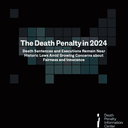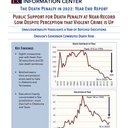
Support for the death penalty in the United States is at its lowest level since November 1972, according to a Gallup poll released October 25. Gallup reported that 60% of respondents said they support capital punishment — off one percentage point from last year — while opposition remained at 37%, matching its highest level since the U.S. Supreme Court struck down the death penalty in 1972. Support has dropped 9 points since 2007 and 20 points since its peak in 1994. The results reflect the same long-term trend of declining support for and increasing opposition to capital punishment that the Pew Poll found earlier this year. Pew found that support for the death penalty had dropped to 49%, marking the first time support had dropped below 50% since 1971. Gallup’s poll this year included a question on the perceived fairness of capital punishment. 50% of respondents believe the death penalty is applied fairly, the lowest level in the question’s 17-year history, and 44% believe it is applied unfairly, the highest level in 17 years. Gallup tied the poll results to larger trends, saying, “This is reflected in, or perhaps the force behind, changes in death penalty laws in recent years, with a total of 12 states abolishing the death penalty or imposing a moratorium in the last decade alone.” Gallup did not include information on levels of support for the death penalty by age, race, sex, religion, or political affiliation as part of its statement on the 2016 poll and did not ask respondents which punishment they found more appropriate for murder: the death penalty or life without parole. Polling this year in California, Florida, Kentucky, Louisiana, and Oklahoma indicates that, when asked that policy question, more Americans favor life without parole over the death penalty.
(J. Jones, “U.S. Death Penalty Support at 60%,” Gallup, October 25, 2016; “Gallup Historical Trends: Death Penalty,” Gallup, last visited October 26, 2016.) See Public Opinion.



